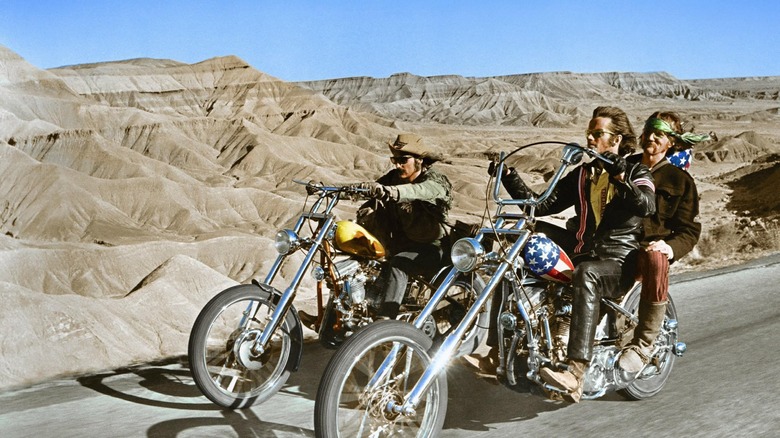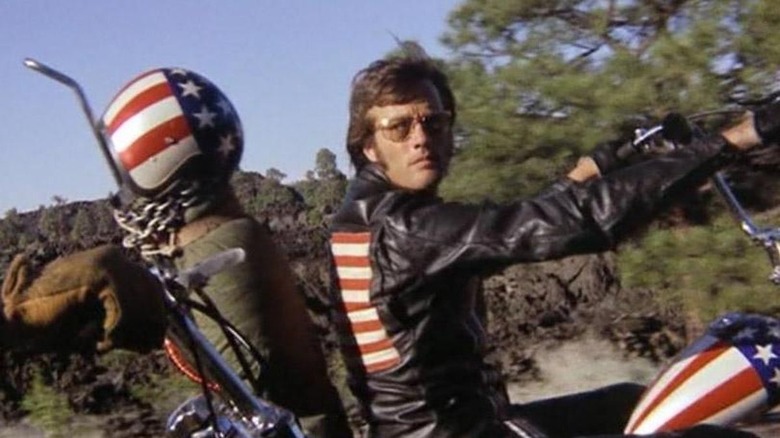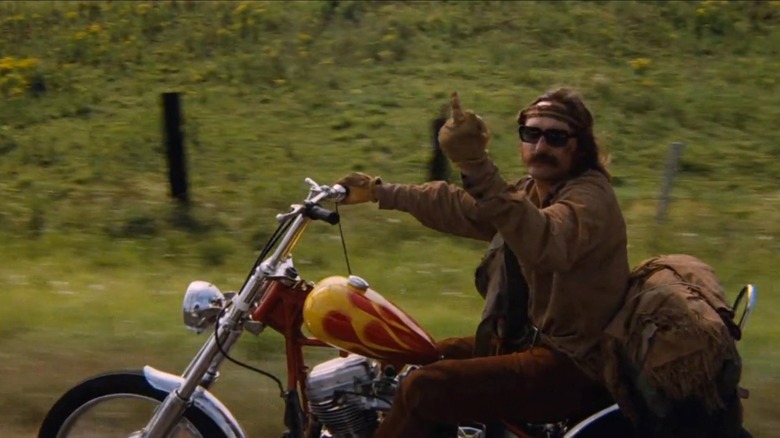Easy Rider Caused A Feud Between Dennis Hopper And Peter Fonda That Was Never Resolved
Of all the trailblazing American films released during the end of the 1960s, "Easy Rider" is easily the most revolutionary. Although the 1969 movie was one of a number of films that helped kickstart the New Hollywood movement of the '70s, it was its box office take of $60 million (over a roughly $400,000 budget) that convinced the major Hollywood studios that such artistic experimentation and boundary pushing could be lucrative as well as attractive to audiences and critics alike.
There are a few ironies surrounding "Easy Rider's" massive financial success. One is the fact that such a bitterly satirical counter-culture movie involving protagonists who deliberately choose to check out of America's capitalist society would itself make so much money. The other is that it would cause a feud between co-stars and co-writers Dennis Hopper (who also directed the film) and Peter Fonda, one that unfortunately lasted until both men passed away. Although the disagreement between the two was primarily about money and credit, there were some other factors that caused bad blood between Hopper and Fonda, ensuring that the duo's friendship would be as doomed as their cinematic counterparts.
"We blew it": writing credit disputes and crossing personal boundaries
Fonda and Hopper's major beef boils down to who really deserved screenplay credit for "Easy Rider." The final film's script is credited to Fonda, Hopper, and writer Terry Southern, a screenwriter who had previously written "Dr. Strangelove" for Stanley Kubrick and "Barbarella" for Roger Vadim. Fonda claimed to have come up with the idea for "Easy Rider" by himself, recalling that "It was just my vision and voice writing it at the Lake Shore Motel in 1967." After Hopper and Southern became involved, however, the actual writing of the script didn't occur as normal.
According to Southern, Hopper and Fonda came to him with just an idea, and the three subsequently "began smoking dope in earnest and having a non-stop story conference." While the trio hashed out a basic story structure, there ended up being a ton of improvisation during shooting, even though Southern clarified that "the improvisation was always within the framework of the obligations of the scene." After the movie was finished, Southern recalled that Fonda called him and "said that he and Dennis liked the film so much they wanted to be in on the screenplay credits," credits which Southern would have to grant per Writers Guild rules, which he ended up doing.
From there, everyone's accounts on what happened with the script credit get more complex. Fonda claimed that Southern left the film and that Hopper "just felt that he deserved to have" sole screenplay credit. Hopper eventually turned litigious, suing Fonda in 1992 for credit and then filing a complaint against Fonda in 1996 over supposedly promised proceeds from the film after the earlier suit had been settled out of court, proceeds that Fonda claimed Hopper "misappropriated investing in phony gold mines." Clearly, the making of "Easy Rider" was so collaborative and mercurial that such legal action would be difficult to definitively resolve.
While these ongoing disputes would sour just about any friendship, the animosity between Fonda and Hopper began while making the film itself. Hopper knew that Fonda's father, the famous screen actor Henry Fonda, had lied to his son about his mother's suicide in 1950, and forced Fonda to confront that real-life trauma on camera for a scene in the movie. As Fonda explained, "I wanted to cut that out of the film ... But I didn't fight with Hopper, we went back and forth, and ultimately he said he wanted me to do it because he was the director."
"A devastatin' blow to our antiquated systems": the never-ending feud
There are disputes over financial compensation and credit in Hollywood that don't turn bitter, but Fonda and Hopper's was no ordinary feud. The two never reconciled, and Hopper went to his grave without making amends, going so far as to ban Fonda from attending his funeral. As Fonda recalled, "I knew that Dennis was dying and I made many attempts to see Dennis ... But he refused." When Fonda arrived at Hopper's funeral service in New Mexico, he discovered that he "was not allowed in the chapel." Fonda himself passed away just five years later.
It's a sad yet ironically appropriate ending to the "Easy Rider" saga, a case of life imitating art: Wyatt (Fonda) and Billy (Hopper), two compatriots on the same trailblazing road who end up irreversibly separated. While it's a shame the one-time collaborators could never reconcile, at least the fruits of their labor (whatever the form of that labor may have been) still continues to inspire and resonate to this day. For better or for worse, Hopper, Fonda, and "Easy Rider" were born to be wild.


